
Why the Organized Crime Media Misrepresents Voluntaryism and Peaceful Anarchy as Chaos and Dystopia
Voluntaryism and Peaceful Anarchy Expose the Violence, Illegitimacy and Criminality of "Government"
Local and decentralized systems are the antidote to the hyper-centralized One World Government dystopia we are now faced with.
From CBDC’s to unconstitutional “Patriot” Acts to “vaccine” passports to carbon footprint tracking apps to the AI driven social credit score system, all of the “solutions” being sold to us are the actual problems that are hastening our digital slavery.
The below two articles provide the real solutions to this WEF, UN, WHO, CFR, illegitimate and criminal Federal government and their Intelligence Industrial Complex hell on earth.
Voluntaryism is the only “ISM” that is fair for everyone. All other “ISM” have a ruling class that gets to use violence and extortion on everyone else to achieve socio-economic objectives. Elections are immoral/illogical and easily rigged by monied interests.
Anarchy doesn’t mean “No Rules”; it specifically means “No Rulers,” but because the organized crime “Rulers” don’t want the public to know there is an option on the menu called “No Rulers,” they have used their weaponized media and propaganda system to change the meaning of the word: “No Rulers” to mean: Chaos and Dystopia.
The practice started in France where the organized crime government of 1893 passed the Lois Scelerates (“villainous laws”) that made it illegal even to use the word: Anarchist. Now organized crime uses their control of the media, Wikipedia, and even the dictionary to confuse the public by associating Anarchy with everything from violence to communism.
The Canadian police were caught staging violence with police dressed as “anarchists” during protests against the G8 in Montebello in 2007.
The word “Liberal” went through a similar weaponization. The root word is Liber which means “free,” Early liberals were similar politically to today’s small government “libertarians.” Because organized crime didn’t want the public to know there was an option on the menu called: “free” or “libertarian,” they used their control of the media to popularize the word to mean “leftist.” The term “libertarian” is, in many ways, a re-branding of the word liberal after it was weaponized and hijacked. Many older advocates of freedom refuse to part with such a noble word and refer to themselves to this day as “Classical Liberals” to denote the difference.
The weaponized media propaganda system would have you believe that Anarchy is something to be feared because without “Gubernare Mente”/ Government, there would be Mad Max chaos and murder in the streets. The reality is that Anarchy is a philosophy of peace where most anarchists believe in the NonAggression Principal, where initiating violence is illegitimate except in self-defense or protection of property.
In a world without rulers, there would still be both a market for justice and armed protective services but without monopoly government, the protectors would only be focused on actual crime (not victimless crimes or road piracy). They would not delusionally believe they have rights that others don’t and could be fired immediately at the first sign of abuse. Many legal theorists believe anarchy would lead to dramatically less crime and violence in society with more prosperity for all.
Understanding Propaganda - The Dictionary as a Weapon
The Merriam-Webster Dictionary is owned by Encyclopedia Britannica, which is owned by the Safra banking family, where Leslie Gelb, President Emeritus of the Council on Foreign Relations, sits on the Editorial Board of Advisors. You can understand the weaponization of language by comparing the 1828 Webster’s Dictionary definition of Anarchy with the current definition from Merriam-Webster’s online dictionary, which has been promoting a pro-Statist version of the word: Socialism in the “Trending Now” section, the #1 spot available to promote a specific word/concept, for over a month as of this writing.
Their own definition of “democratic socialism” laughably claims “would ensure economic growth and a fair distribution of income.” Technically any kind of socialism only achieves “redistribution” at the point of a gun, and “fair” to whom? Who decides? The Bankers and CFR members who own/control Merriam-Webster? Their definition of Socialism also falsely claims that “socialism” was “conflated” with communism when communism IS, by definition, socialism. Compare their claim of socialist “fairness” to their misrepresentation of Anarchy as “Utopian,” disorder and something that “prevailed in the ghetto.”
Voluntaryism (The “Re-Brand”)
Voluntaryism - A political and social philosophy that all forms of human association should be voluntary and based on the Non-Aggression Principal (NAP) that posits that any initiation of violence on peaceful people is illegitimate, no matter what the outcome, but allows for the use of force in self-defense or to protect property. There is also an understanding that the world is a self-organizing system that produces spontaneous order with no need for top-down hierarchical control of society. In a voluntaryist society, all the “services” provided by the government — from protection to roads to charity — would be better supplied by voluntary interaction, the free market, mutual aid societies, co-ops, non-profits, and genuine charity.
In Defense of Anarchy
An absence of rulers does not mean the absence of rules. Only absent a monopoly on force, can non violence become the standard.
10 hr ago
1
Do You Fear Anarchy?
As a political philosophy, anarchy is oft misunderstood and misrepresented. Many fear it due to their misconceptions. They believe that anarchy is an absence of order, hallmarked by violence and the tyranny of direct action. The reality is that this misconception is driven by a lack of understanding. And that lack of understanding represents itself as fear. Fear of the unknown, and fear of a world absent the order of hierarchal structures which are all we have known in our experience as governed beings.
Subscribe
But rather than shying from our principles, and cower to the fear of anarchy tainting our political messages, why not rise to the challenge of defending the truth of our philosophy against the populist disbelief in human freedom and liberty?
While not all of us may be anarchists, our minarchist brothers and sisters join us fondly in fighting towards the same reduction in the size and scope of government, disagreeing only on where we should stop, this fear that permeates society at large hurts them as well, merely through association with us. It is in the interest of all who hold dear the values of human liberty and freedom, to defend the principles of anarchy as the backbone off individualism, peace, non-violence, and sovereign freedom.
But in order to counter the fear, we must first understand.
"Anarchism is the natural and inevitable result of the application of the principles of individualism," -Murray Rothbard.
What is Anarchism?
Anarchism is a political philosophy and movement that seeks to create a society without a state, government, or any other form of involuntary, coercive hierarchy. Anarchists believe that people can organize themselves without the need for these institutions and that cooperation is preferable to competition.
There are many different schools of thought within anarchism, but they all share a common goal of creating a society where individuals are free to live their lives as they see fit. Some anarchists believe that this can be achieved through revolution, while others believe that it can be achieved through peaceful means.
Murray Rothbard was an American economist and philosopher who was one of the most influential thinkers in the anarchist movement. He argued that anarchism was the only way to achieve a truly free society and that the state was a system of coercion and violence.
Rothbard's definition of anarchism is consistent with the anarcho-capitalist philosophy that he advocated. Anarcho-capitalism is a form of anarchism that believes that the free market is the best way to organize society. Anarcho-capitalists believe that the state is unnecessary and that people are capable of self-government.
Rothbard's definition of anarchism is also in line with the historical development of the anarchist movement. The anarchist movement began in the 19th century as a reaction to the rise of the state and the Industrial Revolution. Anarchists believed that the state was a tool of oppression and that it should be abolished. Anarchists believe that all people are equal and that they have the right to self-determination. They also believe that cooperation is preferable to competition.
"Anarchism is the belief that people can organize themselves without the need for a government," -Samuel Konkin.
Why is Anarchism important?
Anarchism is important because it offers a way to create a society where everyone is free and equal. Anarchists believe that people can organize themselves without the need for a government, and that cooperation is better than competition.
Governments have a history of failing to protect the rights of minorities and the most vulnerable people in society. Anarchists believe that the only way to create a truly just and equitable society is to abolish the state.
Human beings have a natural tendency to abuse power. And even in a democratic system of government that is based on checks and balances, we have seen history replete with instances of men concentrating power to impose their will on others.
This is why it is so important to have a system of government that is based on the consent of the governed. Anarchists believe that the best way to ensure that power is not abused is to abolish the state altogether.
Emma Goldman believed that the state was the root of all oppression, that of workers, women, and people of color, and that the only way to create a better world was to abolish it.
anarchists also argue that human nature is inherently cooperative and that people are naturally inclined to work together for the common good. They believe that the state is not necessary for people to organize themselves and that, in fact, the state often inhibits cooperation by creating artificial divisions between people.
Anarchists also argue that the state is inherently violent and that it uses violence to maintain its power, and that the only way to create a truly peaceful society is to abolish the state.
"Anarchism is not a bomb-throwing conspiracy, but a principle of organization which will find its practical application in the economic and political sphere of life," -Emma Goldman.
How can anarchism be implemented?
Anarchism can be implemented in a number of different ways, which many philosophers have explored over the years, but few have taken the opportunity to implement in the contemporary world. Carne Ross, also known as the accidental anarchist, is a former British diplomat and whistleblower, who left the foreign service to enter the world of non profit anarchist organization with his firm Independent Diplomat. He has dedicated his life towards the promotion of anarchist ideas not just in theory, but their real world applications in the modern world.
Ross argues that anarchism can be implemented through a process of "decentralization." This involves gradually transferring power from the state to local communities and individuals. Ross believes that this process can be achieved through a variety of means, including: Economic Decentralization, Political Decentralization, and Social Decentralization.
Economic Decentralization
Economic decentralization is the process of transferring control of the economy from the state to local communities and individuals. This can be done through a variety of means, such as privatization, deregulation, tax cuts, and subsidies.
Economic decentralization has a number of potential benefits, including increased economic efficiency, increased economic growth, increased economic freedom, and increased economic equality.
Economic Efficiency: One of the potential benefits of economic decentralization is increased economic efficiency. When businesses are able to operate without government interference, they are more likely to be efficient and productive. This is because they are able to make their own decisions about how to allocate resources and how to produce goods and services.
Economic Growth: Another potential benefit of economic decentralization is increased economic growth. When businesses are able to keep more of their profits, they are more likely to invest in new businesses and create new jobs. This is because they have more money to invest and they are more likely to see a return on their investment.
Economic Freedom: Another potential benefit of economic decentralization is increased economic freedom. When individuals are able to control their own finances, they are more likely to be free to make their own economic decisions. This is because they are not subject to the same restrictions that are imposed by the government.
Political Decentralization
Political decentralization is the process of transferring power from the central government to local governments and to individuals. This can be done through a variety of means, such as devolution, direct democracy, federalism, and localism.
Political decentralization has a number of potential benefits, including:
Increased efficiency: When government is closer to the people, it is more likely to be efficient and responsive to their needs. This is because the government is better able to understand the needs of the people and to tailor its policies accordingly. For example, a local government may be able to provide better education to its citizens than a central government because it is more familiar with the specific needs of the community.
Increased participation: When people have a say in how they are governed, they are more likely to be engaged in the political process. This is because people are more likely to care about issues that affect them directly. For example, a citizen may be more likely to vote in a local election than a national election because they feel that their vote will have more of an impact.
Increased accountability: When government is closer to the people, it is more likely to be accountable to them. This is because the people are more likely to be able to hold their government accountable for its actions. For example, a citizen may be more likely to protest against a local government than a national government because they feel that their government is more responsive to their concerns.
Increased diversity: When there is a diversity of governments, there is a greater opportunity for experimentation and innovation. This is because governments can learn from each other and can share ideas. For example, a city government may be able to implement a new policy that is successful in reducing crime, and other cities may be able to learn from this success and implement similar policies.
Social Decentralization
Social decentralization is the process of transferring power from centralized institutions to individuals and communities. This can be done through a variety of means, such as direct democracy, mutual aid, and decentralized networks.
Social decentralization has a number of potential benefits, including:
Increased efficiency: When people are able to make decisions for themselves, they are more likely to be efficient and effective. This is because they are more likely to be motivated and to have a vested interest in the outcome. For example, a community may be more likely to clean up its own streets than a government agency.
Increased participation: When people have a say in how they are governed, they are more likely to be engaged in the political process. This is because they are more likely to feel that their voice matters. For example, a community may be more likely to participate in a town hall meeting than a government agency.
Increased accountability: When people are able to make decisions for themselves, they are more likely to be accountable for their actions. This is because they are more likely to be seen as responsible for the outcomes of their decisions. For example, a community may be more likely to hold its members accountable for littering than a government agency.
Increased diversity: When people are able to make decisions for themselves, they are more likely to be able to express their own unique perspectives. This is because they are not bound by the same constraints as a centralized authority. For example, a community may be more likely to have a variety of opinions on how to solve a problem than a government agency.
“Life is about means not ends. There is no utopia to be gained, there is no end-state that is static and eternal, once accomplished.” -Carne Ross
Counter Arguments to Anarchism Refuted
Anarchism, like any philosophy is not without its counter arguments, though many of the most prolific do fail to stand up to scrutiny. Here I’ll just briefly address a few of the most common misconceptions and counter arguments to anarchy in modern political discourse.
Anarchism would lead to chaos and disorder.
The argument that anarchism would lead to chaos and disorder is a common one, but it is not without its flaws.
First, it is important to understand what anarchism actually is. Anarchism is a political philosophy that seeks to abolish all forms of involuntary, coercive hierarchy. This includes the state, capitalism, and patriarchy. Anarchists believe that people can and should organize themselves without the need for a government or other authority figures.
There is no evidence to suggest that anarchism would lead to chaos and disorder. In fact, there are many historical examples of anarchist societies that have been successful and peaceful. For example, the Zapatista communities in Chiapas, Mexico have been self-governing for over 20 years without any major problems.
The argument that anarchism would lead to chaos and disorder is based on the assumption that people are inherently selfish and that they will only act in their own self-interest. However, this is not an accurate view of human nature. People are also capable of cooperation and selflessness. In fact, many people find joy in helping others and working together for the common good.
Anarchism is not a utopian ideology. It is a realistic and achievable goal. It is based on the belief that people can and should be free to organize themselves without the need for a government or other authority figures.
Anarchism would not be able to provide for the common good.
The argument that anarchism would not be able to provide for the common good is based on the assumption that the government is the only entity capable of providing for the common good. However, this is not an accurate view of the world. There are many other ways to provide for the common good, and anarchism is one of them.
Anarchism is based on the idea of mutual aid and cooperation. Under an anarchist system, people would work together to provide for each other's needs. This would be done through a variety of means, such as sharing resources, providing childcare, and building infrastructure.
The Kurdish region of Rojava is an example of an anarchist society that has been successful in providing for the common good. Rojava is a self-governing region that has been in existence for over 10 years. The people of Rojava have built schools, hospitals, and roads, and they have provided food and shelter for their members. Rojava has also been successful in fighting against ISIS and other terrorist groups.
The success of Rojava shows that anarchism is a viable political philosophy. It is possible to create a society that is both free and prosperous without the need for a government or other authority figures.
Anarchism would be too idealistic.
Anarchism is often criticized for being too idealistic. Critics argue that anarchism is unrealistic and that people would not be able to cooperate and work together without the threat of government coercion.
However, the success of the Zapatista, The Rojava, Slab City, and Freetown Christiana show that anarchism is not utopian. It is possible to create a society that is both free and prosperous without the need for a government or other authority figures.
Of course, there are challenges that any society faces, regardless of its political system. But anarchism is no more idealistic than any other political philosophy. In fact, anarchism may be the most realistic political philosophy of all, because it is based on the assumption that people can and should be free to organize themselves without the need for a government or other authority figures.
Anarchism is not a perfect system, but it is a viable alternative to the current system of government. It is a system that is based on the principles of freedom, equality, and cooperation.
Do NOT comply.
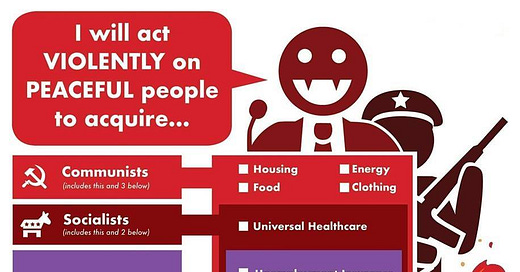



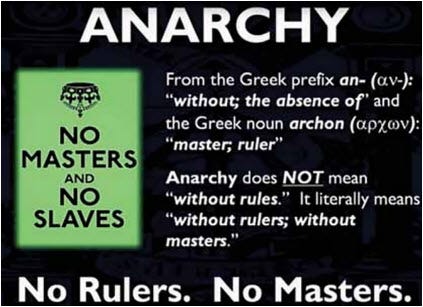
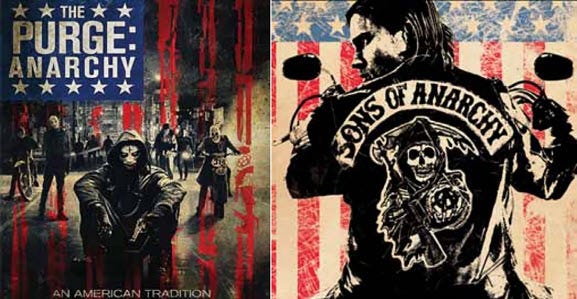
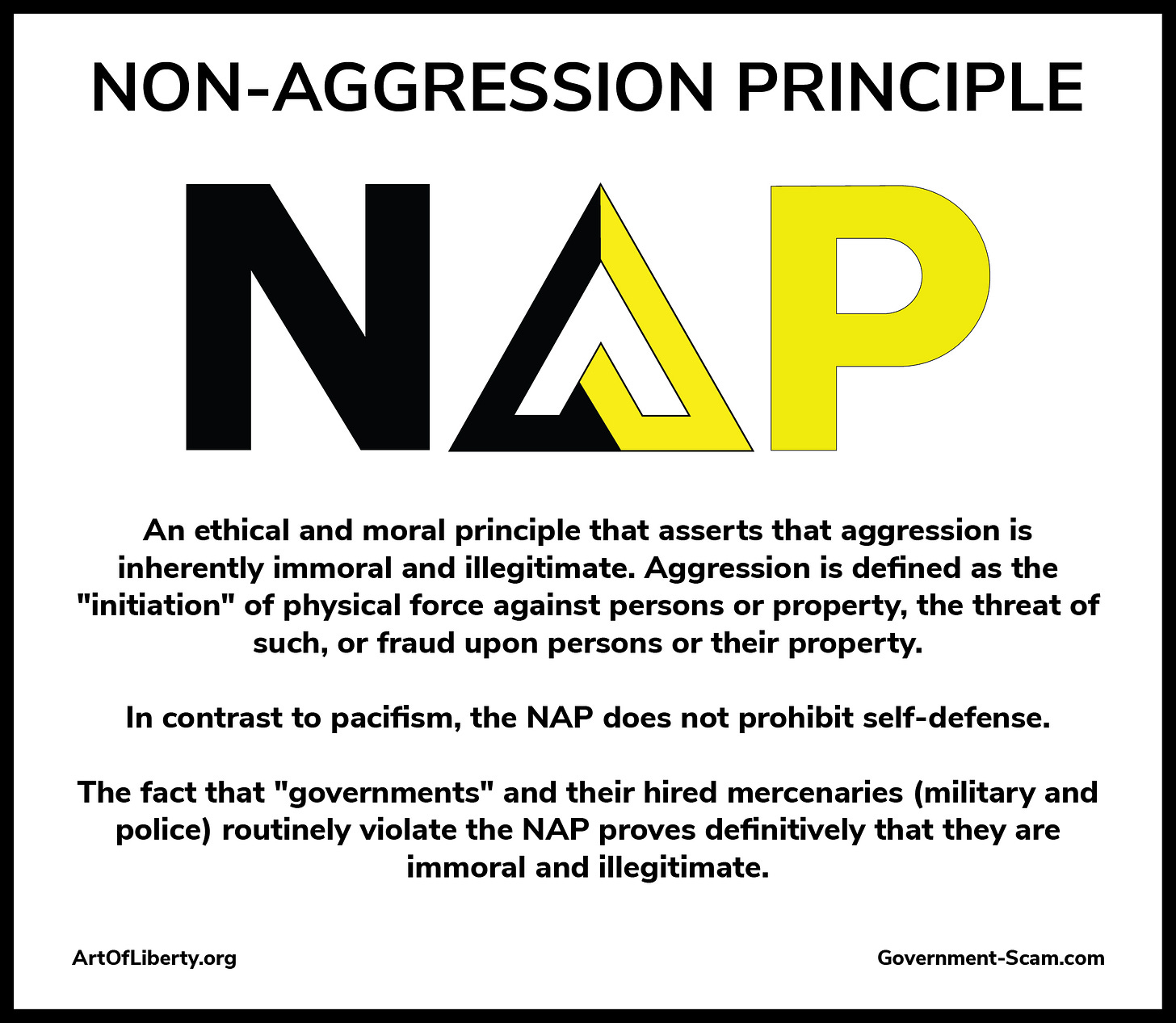
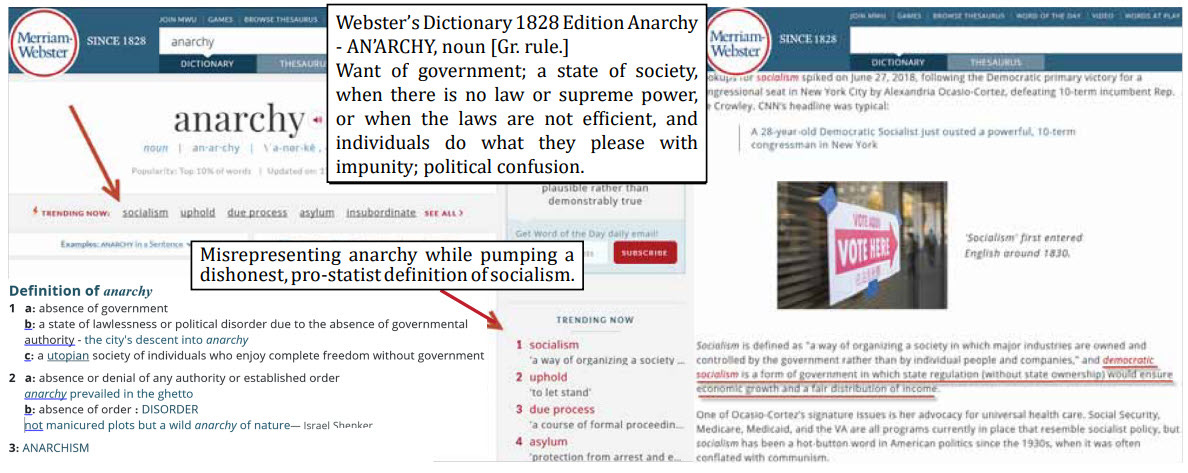
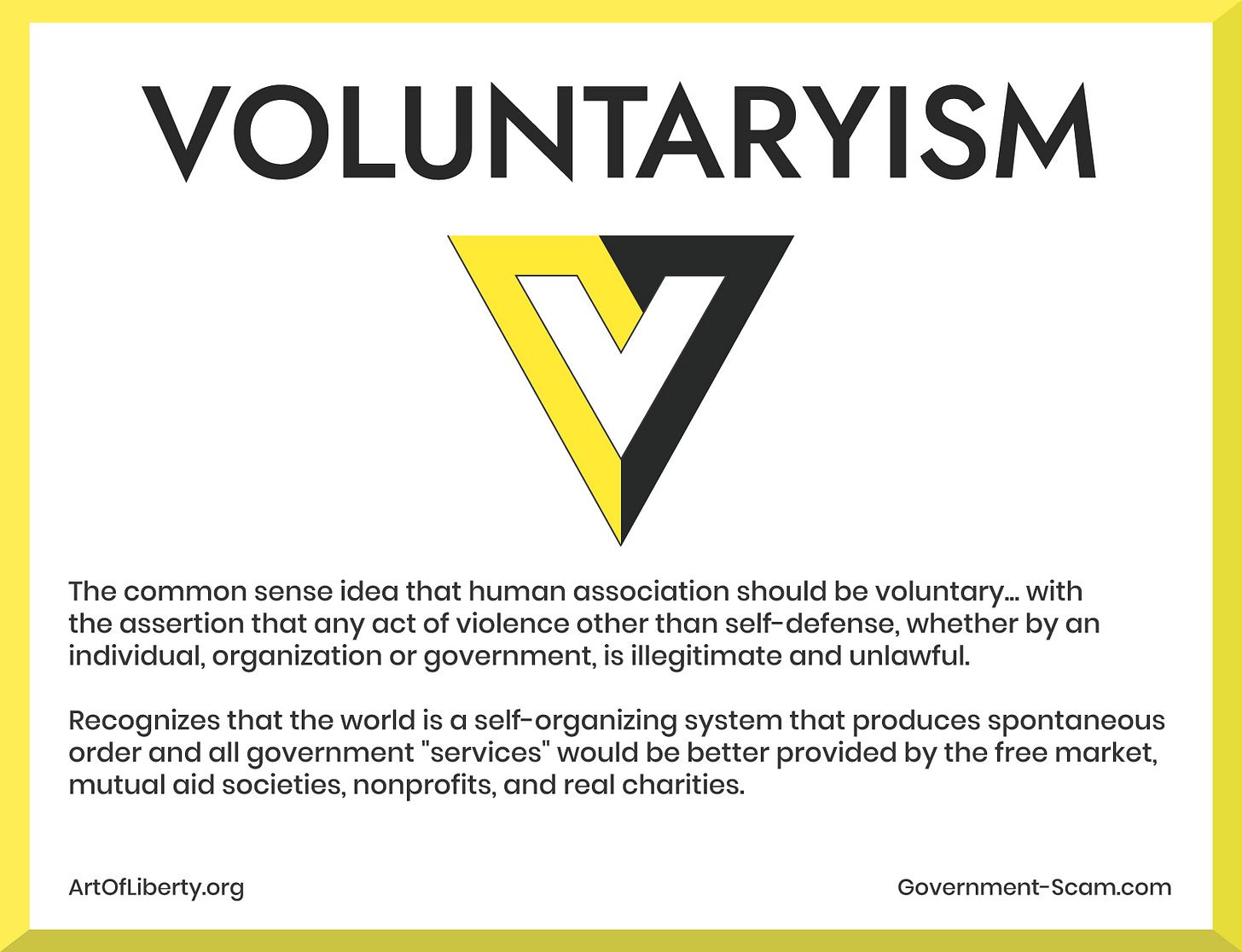
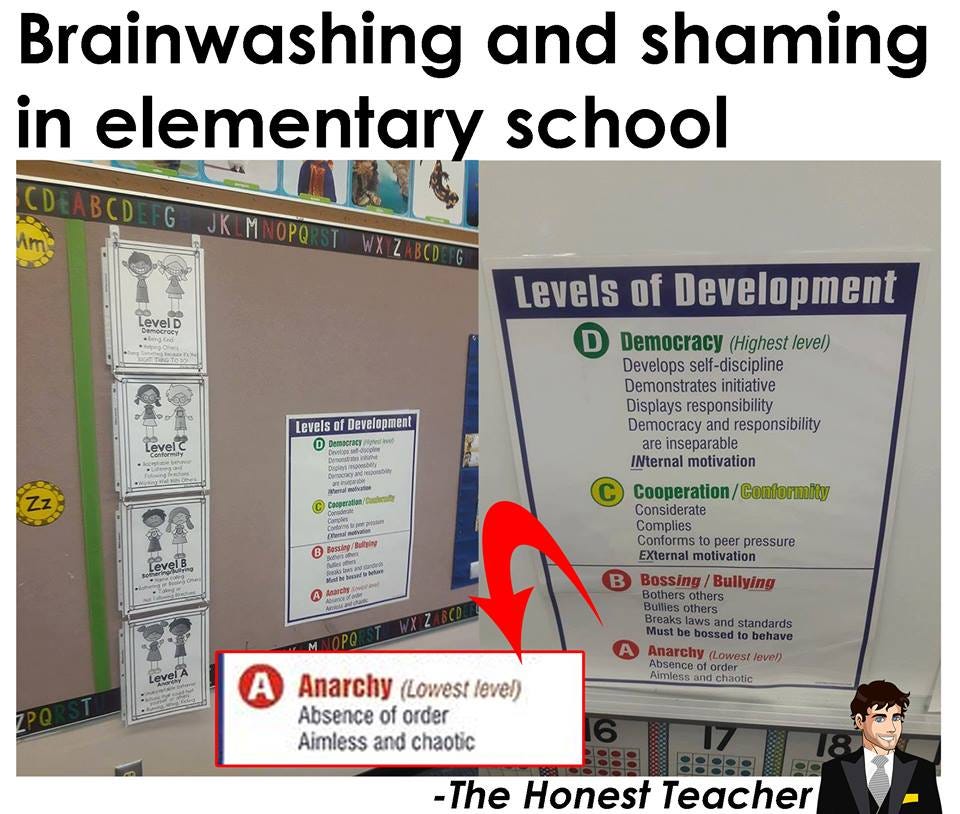




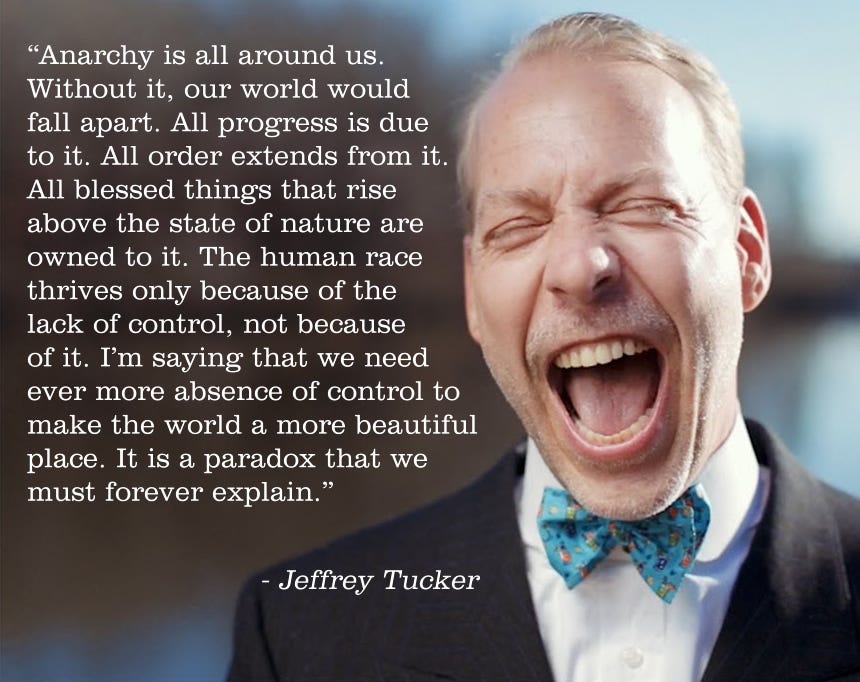












I've been toying with AnCap for a while. Shared this with a neighbor who's still stuck on the left when it comes to the destruction of life via abortion and spaying/neutering human beings via queer theory. She can't get over the CogDis... Nonetheless, she sees evil, greed, corruption everywhere, even in places I never thought to look.
A small incident I read in the true novel "Babi Yar" shows an example of an ungoverned group - albeit short lived.
It goes as such... The boy, Kolya, and an escaped prisoner from a "camp" in Ukraine in 1941 headed out of Kiev to farmfolk about a 2-day journey away. When they got there the people were living in unbelievable abundance (considering everyone in Kiev were on the brink of starvation, essentially). Their store houses were stocked, etc. The two of them were shocked. The explanation given was, after the German Nazi's rousted the Commies they had no overlords at the bullshit collective farms, which had been an embarrassing disaster with low production, and the Germans didn't bother them because of the distance from the cities and the general inability to dedicate attention to them at that time.
A year or so later, Kolya returned to the farm. By then, the Nazi's had created such profound depletion of everything that they went out to the farms and stole everything and beat the shit out of them and took the people to the labor camps.
One season without government interference and abundance.
Down with greed!